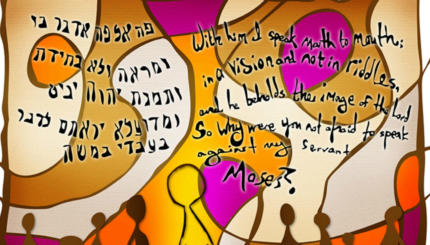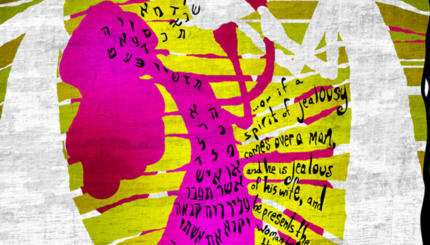Commentary on Parashat Shmini, Leviticus 9:1-11:47
In Parashat Shmini, we come to the moment in the Torah’s narrative when the Israelites, having been freed from slavery in Egypt and received Torah on Sinai finally complete and dedicate the mishkan, God’s portable sanctuary in the wilderness. With the completion of this structure, sacrifices on behalf of the people can be offered. The Torah describes this moment:
Aaron lifted his hands toward the people and blessed them; and he stepped down after offering the sin offering, the burnt offering, and the offering of well-being. Moses and Aaron then went inside the Tent of Meeting. When they came out, they blessed the people; and the Presence of the Lord appeared to all the people. Fire came forth from before the Lord and consumed the burnt offering and the fat parts on the altar. And all the people saw, and shouted, and fell on their faces. (Leviticus 9:22–24)
This narrative is a little confusing: Why did Aaron apparently bless the people twice, both before or after the sacrifice? Targum Yonatan, an ancient Aramaic translation and interpretation of the Torah, explains the scene like this: “Aaron spread his hands towards the people and blessed them; he came down from the altar happy, having finished offering the sin offering, the burnt offering, and their libations. When the sacrifices had been done and the Shekhinah (God’s presence) did not reveal itself, Aaron was shocked; he said to Moses, ‘Perhaps I did not do it according to the word of God?’ Moses and Aaron went up to the Tent of Meeting and prayed for the people of Israel; they came out and blessed the people, saying, ‘May God willingly accept your offerings, and remit and forgive your sins.’ Immediately the Shekhinah revealed itself to all the people. A fire went forth from before God and consumed on the altar the burnt offering and its fats; all the people saw and acknowledged, and fell on their faces in prayer.”
Aaron twice blesses the people and only the second blessing makes the sacrifices efficacious. Rashi argues that the first blessing of Aaron for the people was the priestly blessing, from Numbers 6:24–26 that parents recite over their children on Friday nights and that is also part of synagogue liturgy: “May the Lord bless you and keep you; may the Lord make the Lord’s face shine upon you and be gracious to you; may the Lord lift the Lord’s countenance upon you and give you peace.” Compare this to the blessing Targum Yonatan interprets Aaron as giving after the sacrifices have been offered: “‘May God willingly accept your offerings, and remit and forgive your sins.” While the first blessing is about what God will do for the people, without any action or commitment on the part of the people, and the latter is about God accepting something the people have offered, implying a more mutual relationship.
Although this second blessing did not become a regular part of Jewish liturgy, it is worth contemplating. The blessing could be read as largely directed at God — asking, perhaps convincing, God to accept the sacrifice. On the other hand, perhaps the blessing is for the people, a reminder that making the sacrifice alone is not enough — they must also repent of their sins to be in the right relationship with God. Only at that point, when the people integrate this into their understanding, can the sacrifices work properly. It takes more than the motions for the sacrifices to be effective. But when sacrifices are truly integrated with teshuvah, the result is that God reveals the Divine Presence to the people.

Help us keep Jewish knowledge accessible to millions of people around the world.
Your donation to My Jewish Learning fuels endless journeys of Jewish discovery. With your help, My Jewish Learning can continue to provide nonstop opportunities for learning, connection and growth.
The purposes of sacrifices, then (and, in our modern era, their replacements: prayer, Torah study, good deeds) is not simply unidirectional. Sacrifices were not simply a gift, or a meal, for a hungry God. Sacrifices require something else of us, something of our person, and also ask for a response from God. The result is nothing less than revelation, a real relationship that brings the people closer to God and God closer to the people. May our prayers, Torah study and good deeds do the same today.
Read this Torah portion, Leviticus 9:1-11:47 on Sefaria
Sign up for our “Guide to Torah Study” email series and we’ll guide you through everything you need to know, from explanations of the major texts to commentaries to learning methods and more.
Subscribe to A Daily Dose of Talmud: Daf Yomi for Everyone — every day, you’ll receive an email that offers an insight from each page of the current tractate of the Talmud. Join us!
About the Author: Rabbi Jaclyn Rubin-Blaier spent several years studying Talmud and halakhah at the Jewish Theological Seminary, Drisha, Yeshivat Hadar, Pardes, and Matan, and she received ordination in 2013. She teaches Judaics to children in a variety of settings, and she loves the questions children ask!



